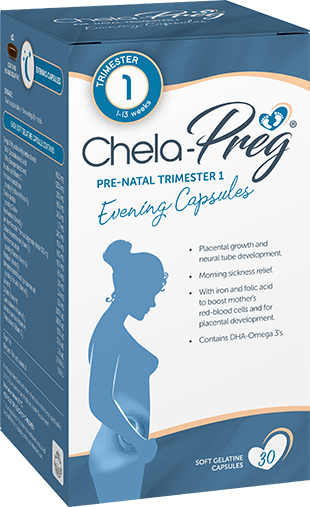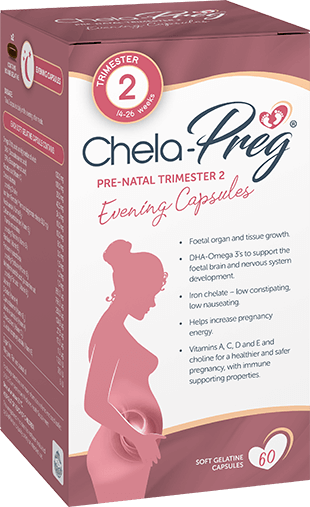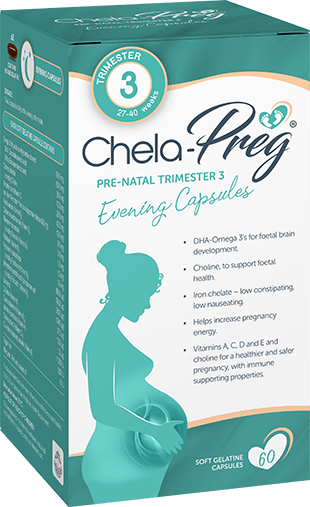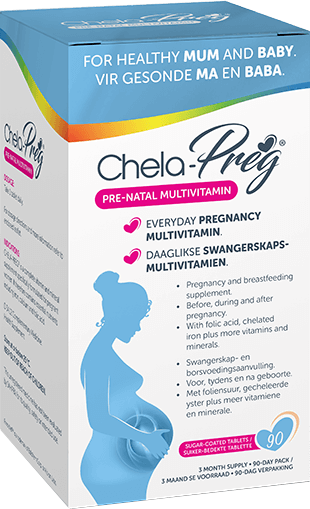
First-time Mom. First-time pregnant. First trimester!
Are you a first-time pregnant mom in your first trimester? Are you bombarded with online information about your pregnancy and don’t know where to start? What you can start with is your nutrition. Starting out your pregnancy right whether it is your first-time or not, is essential for your growing baby.1a,2a
Why take a multivitamin during pregnancy?
From mom to baby. Optimal maternal nutrition, including essential vitamins and minerals, is important for your growing baby’s development.1a,2a Making nutrition a priority at the start can have a longer term impact on your child’s health.2a
 Did you know that pregnancy women across the globe suffer from micronutrient malnutrition during their pregnancy?3a These women typically suffer from anaemia (lack of enough iron) and many more do not take in enough folate, zinc or iodine during their pregnancy.3a
Did you know that pregnancy women across the globe suffer from micronutrient malnutrition during their pregnancy?3a These women typically suffer from anaemia (lack of enough iron) and many more do not take in enough folate, zinc or iodine during their pregnancy.3a
Even for women who are able to access a balanced diet, an inadequate micronutrient status is common.2b One reason for this is that that during pregnancy micronutrient requirements increase more than your usual dietary energy requirements.2c
Nutrition is about more than just right now.1d,2a,d It is important to know that vitamin and mineral deficiencies affect the growing baby and can result in pregnancy complications such as low birth weight or premature birth.3b The short- and long-term benefits of an optimum micronutrient status can have a significant impact on health for years to come.2d
What micronutrients are needed?
Some of the more common minerals and vitamins include iron for preventing anaemia and low birth weight; folate for proper neural tube (spinal cord) development; iodine for brain development; calcium and vitamin D for preventing maternal hypertension (pre-eclampsia) and pre-term birth.1b
Take the guess work out. Multiple multi-nutrient tablets are available to simplify vitamin and mineral supplementation during the prenatal stages of pregnancy.3c Typical multi-nutrient tablets will provide the daily recommended intakes for:
Vitamins A, B1, B2, B6, B12, C, D, E and niacin, folic acid, copper, selenium and iodine with iron and zinc.1e Others can also include chromium, magnesium, manganese, molybdenum, DHA, omega 3, EPA, choline, biotin and vitamin K.4
 Additionally, prenatal micronutrient supplements have now evolved to deliver the right-amounts-at-the-right-time during the different stages of pregnancy.1c,4
Additionally, prenatal micronutrient supplements have now evolved to deliver the right-amounts-at-the-right-time during the different stages of pregnancy.1c,4
Multi-micronutrient supplementation during pregnancy combined with the consumption of a well-balanced diet can help to achieve your optimal pregnancy nutritional status – for pregnancy can beyond.2e,f
It’s time to start. Start your pregnancy nutrition out right, first-time!
Ask your doctor, nurse of pharmacist for further advice on taking multivitamin supplements during your pregnancy.
Individualised micronutrition. Trimester specific.
![]() Designed for each unique stage of pregnancy.
Designed for each unique stage of pregnancy.
References:
- Cretin I, Bühling K, Demir C, et al. Impact of Micronutrient Status during Pregnancy on Early Nutrition Programming. Human Nutrition: Review Article. Ann Nutr Metab 2019;74:269–278.
- Oh C, Keats EC, Bhutta ZA. Vitamin and Mineral Supplementation During Pregnancy on Maternal, Birth, Child Health and Development Outcomes in Low- and Middle-Income Countries: A Systematic Review and Meta-Analysis Nutrients 2020;12:491: doi:10.3390/nu12020491.
- World Health Organisation (WHO). In collaboration with the United Nations Children’s Fund (UNICEF) and the Micronutrient Initiative (MI). CALL FOR AUTHORS. Multiple micronutrient supplements in pregnancy: implementation considerations for successful integration into existing programmes.
- CHELA-Preg® Trimester 1/2/3 Professional Information, {date}.





